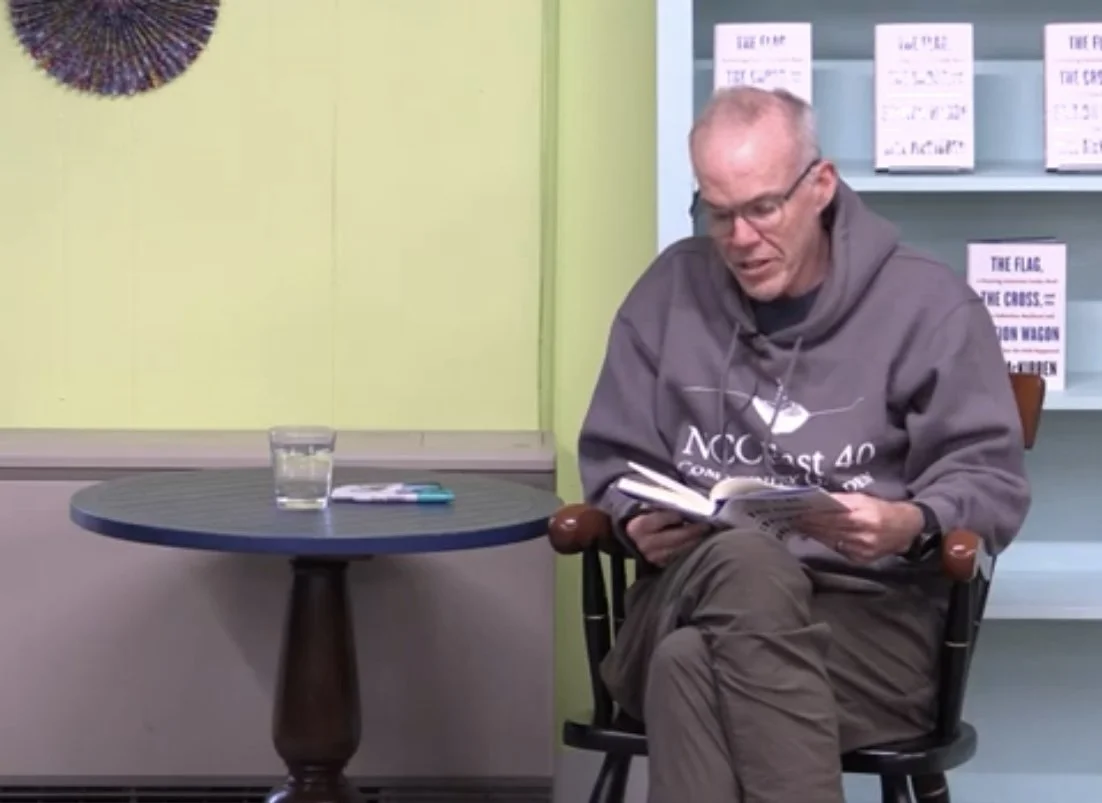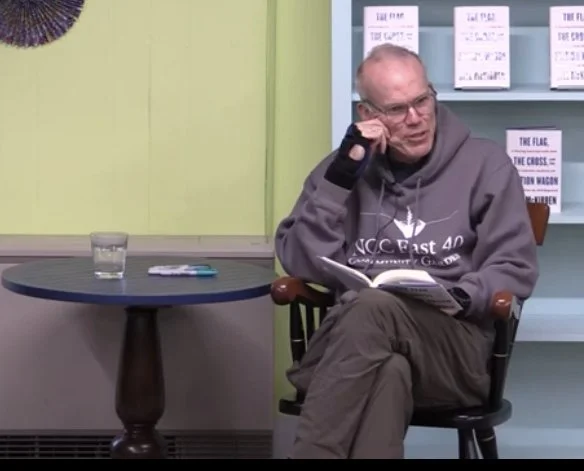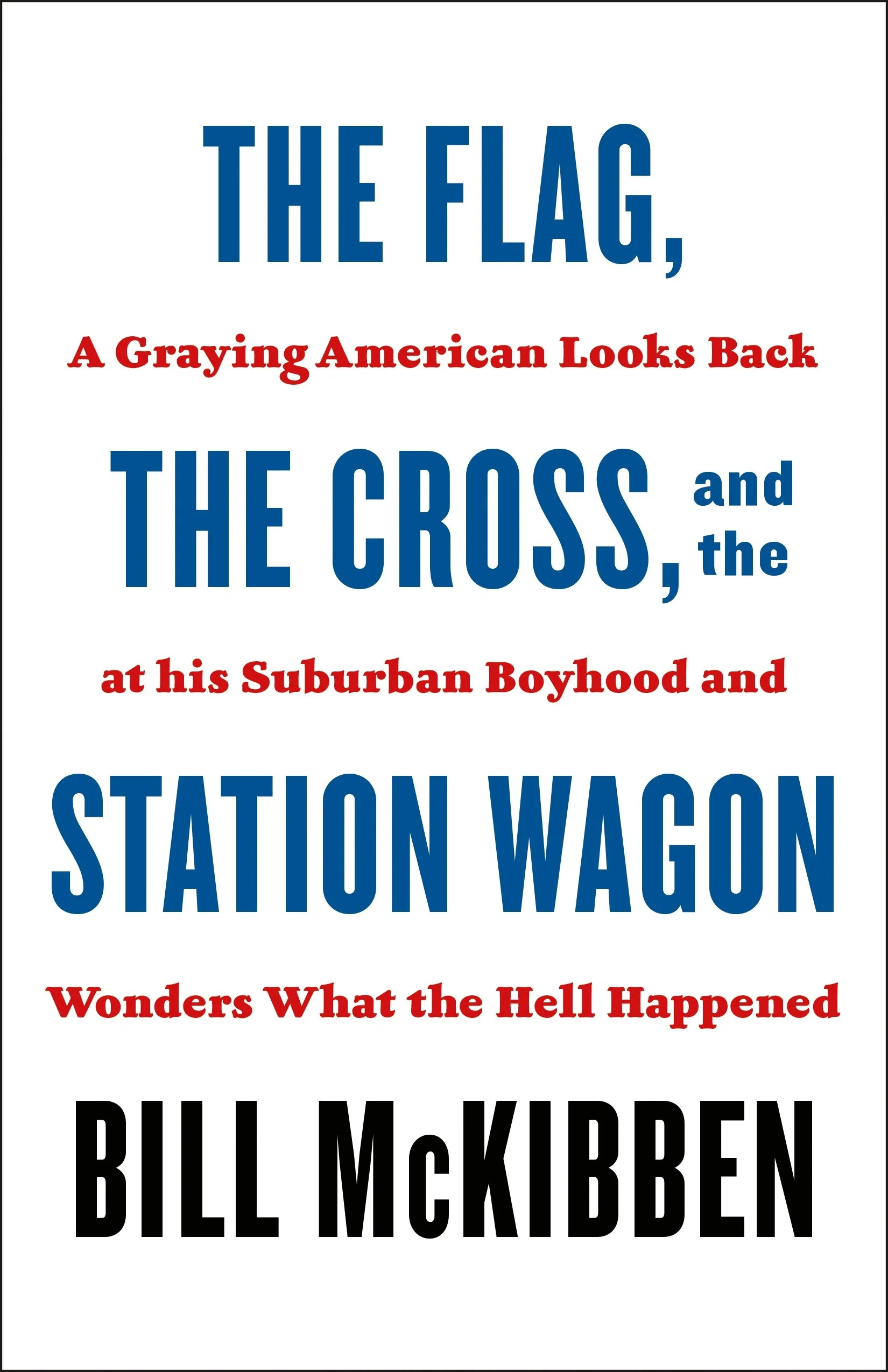Author Bill McKibben reflects on American patriotism, faith and prosperity
July 13, 2022 | By Judi ByronAuthor and activist Bill McKibben speaks at Bridgeside Books recently. Screenshots
On a recent stop in Waterbury, Vermont activist and prolific author Bill McKibben asked, “What went sour with American patriotism, American faith, and American prosperity?”
That’s the central question McKibben poses in his latest book, “The Flag, the Cross, and the Station Wagon,” which carries the subtitle: “A Graying American Looks Back at His Suburban Boyhood and Wonders What the Hell Happened.”
McKibben spoke to a gathering at Bridgeside Books on June 18 where he shared his thoughts on the last 50 years of America’s trajectory.
Founder of the grassroots climate action organization 350.org, his more recent endeavor is called Third Act and it focuses on organizing people over the age of 60 for action on climate and justice.
McKibben has written extensively on the impact of global warming and this latest book is no exception. The author began his talk with the self-deprecating observation that he had “none of the obstacles, miseries or difficulties that make a good memoir.” In fact, he explained, he was statistically average. “I had a boring and average life,” McKibben chuckled. Despite that, the book has landed on the Boston Globe New England Best Seller list.
Cover image from McKibben’s latest book. Courtesy photo
Reading selections, McKibben pointed to the systemic racism that originated from the beginnings of American history and he drew connections to the wealth gap between Black and white today. He referenced Paul Revere’s own account of his ride from Boston to Lexington, (incidentally, where McKibben was born and raised and gave tours in full regalia to tourists as a boy). McKibben highlighted Revere’s oblique reference to a description of a place noted simply as the place “where Mark was hung in chains.” In researching that phrase, McKibben dug deep and finally hit paydirt when he discovered that Mark was Mark Codman, an enslaved man. He proceeded to tell the audience of the horrific torture, subsequent death, and the iron cage which held Codman’s body for 40 years above the Charlestown Common, as a warning not to mess with the system.
“The Flag” portion of his talk led into “The Cross,” examining American religiosity, from building a working community and being socially conscious to the individual, with the emphasis on one’s personal relationship to God. Statistically, 52% of Americans belonged to a mainline Protestant denomination in 1970. Today that number is 15%, primarily the older generation, McKibben said.
“The Station Wagon” segment, McKibben explained, embodies the story of American politics and prosperity.
In 1950, the largest public works program in American history – the construction of the interstate highway system – changed forever the course of environmental history, the author noted. McKibben ticked off statistic after statistic of what he terms our “violent collision between car culture and geopolitics.” By 1970, Americans (at 3% of the world’s population) consumed one-third of the world’s energy, and most of that was from vehicles, not factories, he said. The number of vehicles on the road grew almost five times (to 18 million) from what existed just two decades prior, McKibben pointed out.
He lauded President Jimmy Carter’s prescience when he was in office from 1977 to 1981. Carter installed solar panels on the White House (removed by his successor, President Ronald Regan) and McKibben quotes Carter’s inaugural address: “Even our great nation has its recognized limits. The energy crisis is a reminder that ours is the most wasteful nation on earth.” In 1980, Carter had a goal that America acquire 20% of its energy from solar power by the year 2000. Why did this not happen? It did not remain a priority, McKibben said.
Although the damaging finger of societal blame begins to suggest a feeling of helplessness, mistrust in systems, and dystopia, McKibben turns the table and brings hope. He points to three of his undertakings that he said serve as an invitation to think differently.
First, 350.org, the grassroots climate organization that McKibben created, has now grown into a worldwide climate change movement. The divestment campaign he’s championed to reject investment in fossil-fuel companies is rooted in college campus activism. He said it’s contributed to the momentum behind the proposed Green New Deal that today’s lawmakers have before them, calling for public policy to address climate change along with related goals such as job creation and reducing economic inequality.
And Third Act, with which McKibben is currently absorbed is a movement aimed at those over the age of 60 to work on climate change and democracy. He acknowledges that while young people are important – they have the passion, the enthusiasm, the energy, the idealism to work toward these goals – they lack the structures to get it done. What folks over 60 have is resources, time, money, and political punch, McKibben said.
He said Third Act refers to the third act in one’s life. “If you are in your 60s, 70s or 80s,” declared McKibben, “you either participated in or witnessed the most incredible social, cultural and political transformation.” As an example, McKibben recalled that 20 million people attended the first Earth Day demonstration in 1970. Within a year or two, he said, Congress passed the Clean Air and the Clean Water Act. “It worked!” he exclaimed.
McKibben explained that people in the second act stage of life tend to focus more on consumerism than citizenship. But in the third act of life, people of a certain age have the skills and resources acquired over a lifetime. Still in its infancy, Third Act is already forming chapters around Vermont and in cities across the United States. (See its website thirdact.org for more information.)
McKibben concluded by saying he is positive and enthusiastic about the future, and he invites everyone to take their role seriously in redeeming the “story of America.” Just as we cannot take for granted the physical stability of our planet, McKibben said, citizens cannot take for granted the stability of our democracy.
McKibben’s talk at Bridgeside Books was recorded and is online at OrcaMedia.net. Judi Byron is the adult program manager at the Waterbury Public Library.




